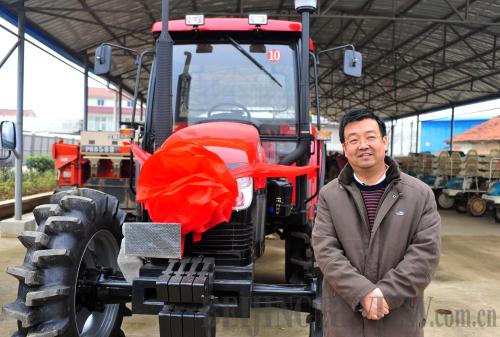|
 |
|
A BIG PRIZE: Tan Lunwei stands next to a tractor awarded to him by the local government for his contribution to agriculture (XIAO YIJIU) |
A large stretch of freshly plowed farmland bathes in the warm March sunlight in Longgang Village in Xiaogan City, central China's Hubei Province. Beside the field, farmers employed by the Chunhui Group are digging and repairing irrigation channels.
Chunhui Group is an agricultural company that farms 6,667 hectares of land and boasts an annual production value of 2.5 billion yuan ($396 million). It operates four agricultural cooperatives and one research institute. Because of the group's scale, its president Tan Lunwei is nicknamed a "super farmer." Tan used to be a businessman. He went into farming two years ago because of his insights into modern agriculture.
In 2007, Tan, then a real estate developer, entered the grain storage business. Since local purchases could fill only 80 percent of his granaries' capacity, every year he had to purchase grain from Henan Province, a major grain producer in central China.
But according to Tan, transporting grain was costly and the quality of grain was not guaranteed. Then, the idea of growing grain himself first occurred to him.
"When visiting villages, I was shocked to find that those working in the field were all aged in their 60s and most young farmers had moved to cities to work. Large parcels of land were lying in waste. Ten years later, these farmers will be too old to grow crops. Then who will produce grain?" Tan said. This thought increased his determination to farm the land.
When traditional agricultural production methods are challenged by rapid urbanization, agriculture must be modernized to ensure food safety, Tan said.
In March 2010, Chunhui Group's subsidiary Weiye Chunhui Rice Co. leased 1,333 hectares of land in the rural area of Xiaogan to grow rice.
In 2011, the group set up Longgang Land Shareholding Cooperative, which covered eight villages in Sancha Township in Xiaogan. Chunhui Group contributed agricultural machines, while villages contributed land. The cooperative is managed jointly and profits are shared.
Liu Shuntian, director of the cooperative, said that a few years ago many plots of arable land in local villages were left uncultivated, and at maximum, the idle land accounted for half of the total availability.
"Now through intensive management, crops have been planted in all the land parcels. We are very happy to see that," Liu said.
Tan has also formed cooperatives with farmers in other places in Hubei such as Hanchuan, Yingcheng and Yunmeng. Through cooperative, long-term land leases or seasonal short-term leases, Chunhui Group manages nearly 6,667 hectares of land.
| 